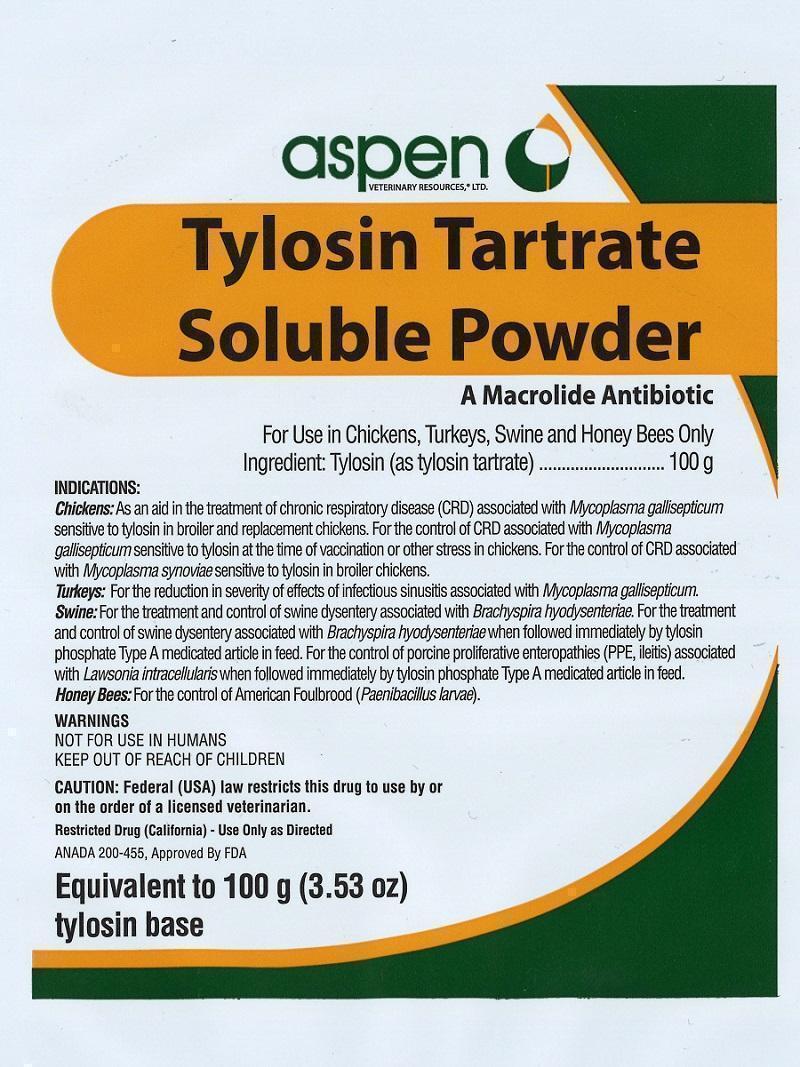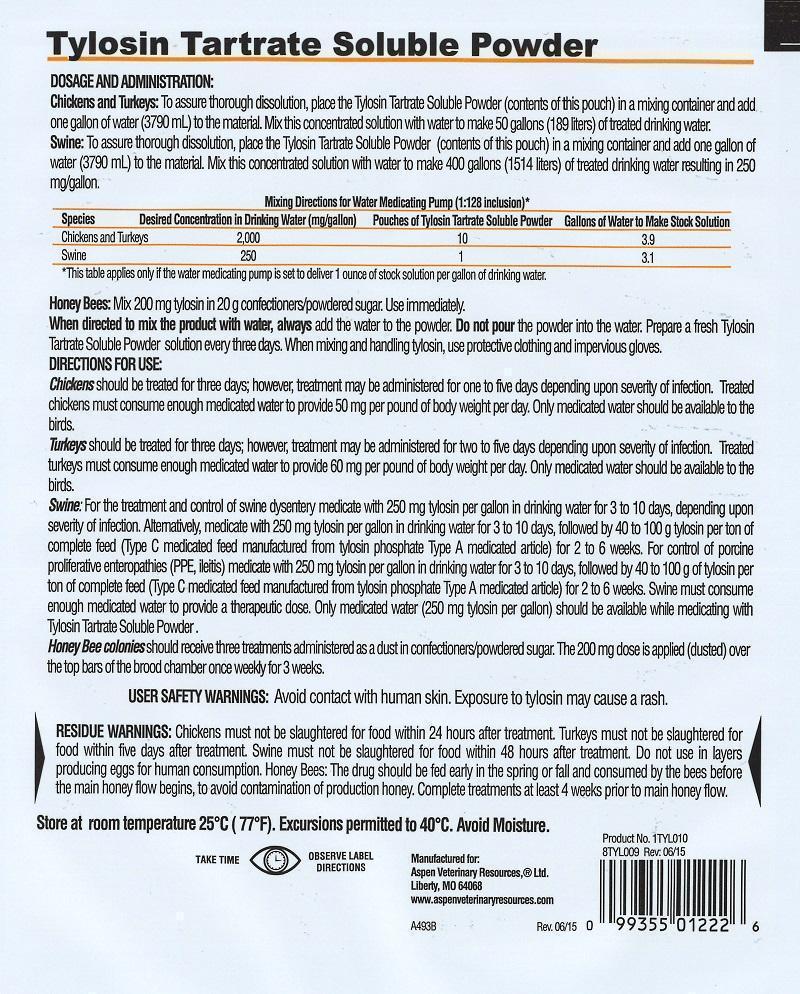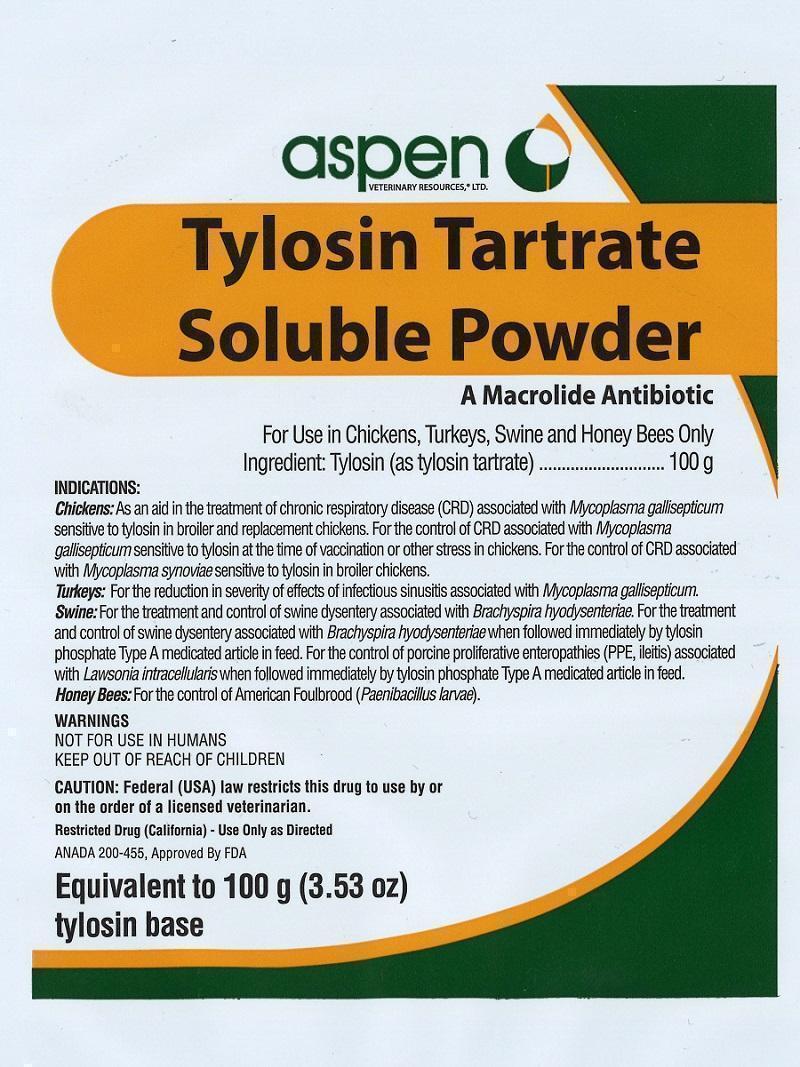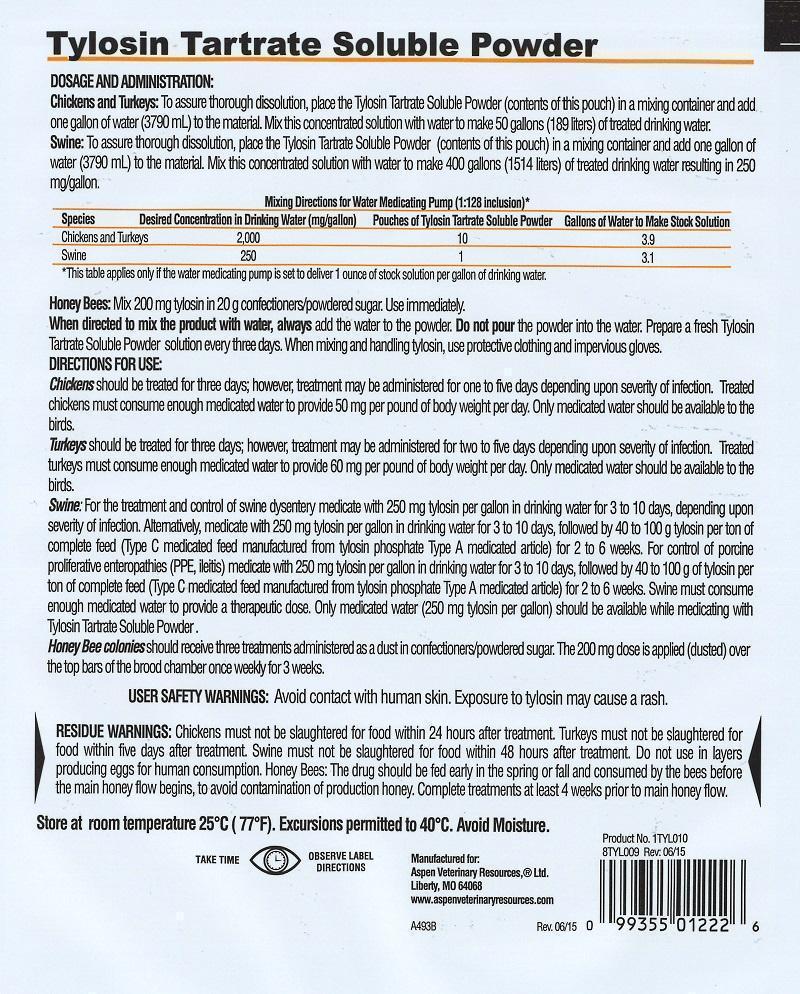Label: TYLOSIN TARTRATE powder, for solution
- NDC Code(s): 46066-504-47, 46066-504-48
- Packager: Aspen Veterinary Resources, LTD
- Category: PRESCRIPTION ANIMAL DRUG LABEL
- DEA Schedule: None
- Marketing Status: Abbreviated New Animal Drug Application
Drug Label Information
Updated December 5, 2023
If you are a consumer or patient please visit this version.
- Download DRUG LABEL INFO: PDF XML
- Official Label (Printer Friendly)
-
INDICATIONS & USAGE
A Macrolide Antibiotic
For Use in Chickens, Turkeys, Swine and Honey Bees Only
Ingredient: Tylosin (as Tylosin Tartrate)...........100 g
INDICATIONS:
Chickens: As an aid in the treatment of chronic respiratory disease (CRD) associated with Mycoplasma gallisepticum sensitive to tylosin in broiler and replacement chickens. For the control of CRD associated with Mycoplasma gallisepticum sensitive to tylosin at the time of vaccination or other stress in chickens. For the control of CRD associated with Mycoplasma synoviae sensitive to tylosin in broiler chickens.
Turkeys: For the reduction in severity of effects of infectious sinusitis associated with Mycoplasma gallisepticum.
Swine: For the treatment and control of swine dysentery associated with Brachyspira hyodysenteriae. For the treatment and control of swine dysentery associated with Brachyspira hyodysenteriae when followed immediately by tylosin phosphate Type A medicated article in feed. For the control of porcine proliferative enteropathies (PPE, ileitis) associated with Lawsonia intracellularis when followed immediately by tylosin phosphate Type A medicated article in feed.
Honey Bees: For the control of American Foulbrood (Paenibacillus larvae).
- WARNINGS
- GENERAL PRECAUTIONS
-
DOSAGE & ADMINISTRATION
DOSAGE AND ADMINISTRATION:
Chickens and Turkeys: To assure thorough dissolution, place the Tylosin Tartrate Soluble Powder (contents of this pouch) in a mixing container and add one gallon of water (3700 ml) to the material. Mix this concentrated solution with water to make 50 gallons (189 liters) of treated dinking water.
Swine: To assure thorough dissolution, place the Tylosin Tartrate Soluble Powder (contents of this pouch) in a mixing container and add one gallon of water (3700 ml) to the material. Mix this concentrated solution with water to make 400 gallons (1514 liters) of treated drinking water resulting in 250 mg/gallon.
Mixing Directions for Water Medicating Pump (1 :128 inclusion)* Species Desired Concentration in Drinking Water (mg/gallon) Pouches of Tylosin Tartrate Soluble Powder Gallons of water to make Stock Solution Chickens/Turkeys 2,000 10 3.9 Swine 250 1 3.1 *This table applies only if the water medicating pump is set to deliver 1 ounce of stock solution per gallon of drinking water.
Honey Bees: Mix 200 mg tylosin in 20 g confectioners/powdered sugar. Use immediately.
When directed to mix the product with water, always add the water to the powder. Do not pour the powder into the water. Prepare a fresh Tylosin Tartrate Soluble Powder solution every three days. When mixing and handling tylosin, use protective clothing and impervious gloves.
-
INSTRUCTIONS FOR USE
DIRECTIONS FOR USE:
Chickens should be treated for three days; however, treatment may be administered for one to five days depending upon severity of infection. Treated chickens must consume enough medicated water to provide 50 mg per pound of body weight per day. Only medicated water should be available to the birds.
Turkeys should be treated for three days; however, treatment may be administered for two to five days depending upon severity of infection. Treated turkeys must consume enough medicated water to provide 60 mg per pound of body weight per day. Only medicated water should be available to the birds.
Swine: For the treatment and control of swine dysentery medicate with 250 mg tylosin per gallon in drinking water for 3 to 10 days, depending upon severity of infection. Alternatively, medicate with 250 mg tylosin per gallon in drinking water for 3 to 10 days, followed by 40 to 100 g tylosin per ton of complete feed (Type C medicated feed manufactured from tylosin phosphate Type A medicated article) for 2 to 6 weeks. For control of porcine proliferative enteropathies (PPE, ileitis) medicate with 250 mg tylosin per gallon in drinking water for 3 to 1 0 days, followed by 40 to 1 00 g of tylosin per ton of complete feed (Type C medicated feed manufactured from tylosin phosphate Type A medicated article) for 2 to 6 weeks. Swine must consume enough medicated water to provide a therapeutic dose. Only medicated water (250 mg tylosin per gallon) should be available while medicating with Tylosin Tartrate Soluble Powder.
Honey Bee colonies should receive three treatments administered as a dust in confectioners/powdered sugar. The 200 mg dose is applied (dusted) over the top bars of the brood chamber once weekly for 3 weeks.
- USER SAFETY WARNINGS
-
RESIDUE WARNING
RESIDUE WARNINGS: Chickens must not be slaughtered for food within 24 hours after treatment. Turkeys must not be slaughtered for food within five days after treatment. Swine must not be slaughtered for food within 48 hours after treatment. Do not use in layers producing eggs for human consumption. Honey Bees: The drug should be fed early in the spring or fall and consumed by the bees before the main honey flow begins, to avoid contamination of production honey. Complete treatments at least 4 weeks prior to main honey flow.
- STORAGE AND HANDLING
- PRINCIPAL DISPLAY PANEL
-
INGREDIENTS AND APPEARANCE
TYLOSIN TARTRATE
tylosin tartrate powder, for solutionProduct Information Product Type PRESCRIPTION ANIMAL DRUG Item Code (Source) NDC:46066-504 Route of Administration ORAL Active Ingredient/Active Moiety Ingredient Name Basis of Strength Strength TYLOSIN TARTRATE (UNII: 5P4625C51T) (TYLOSIN - UNII:YEF4JXN031) TYLOSIN 100 g in 100 g Packaging # Item Code Package Description Marketing Start Date Marketing End Date 1 NDC:46066-504-47 100 g in 1 PACKET 2 NDC:46066-504-48 100 g in 1 JAR Marketing Information Marketing Category Application Number or Monograph Citation Marketing Start Date Marketing End Date ANADA ANADA200455 05/15/2015 Labeler - Aspen Veterinary Resources, LTD (627265361)




